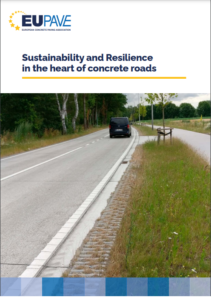Compilation of fact sheets, “Sustainability and Resilience in the heart of concrete roads”
16 October 2023
Everyone today is aware of the global challenges facing our society. The concept of “sustainable construction” has been at the heart of the construction world for many years, focusing on the three well-known pillars: economy, environment and society. With the issue of global warming, the debate is now more focused on reducing CO2 emissions with a roadmap towards complete decarbonisation by 2050.
EUPAVE is convinced that rigid solutions – concrete pavements and hydraulically bound base layers – can contribute to a more sustainable and resilient transportation network. Therefore, EUPAVE’s Sustainability & Resilience Working Group has prepared 6 fact sheets covering the different themes. The work started with an infographic “Concrete pavements make roads more sustainable”, showing the basic messages
in the different domains. Next, the fact sheets were drafted in which each sub-aspect was discussed in more detail, each time based on the latest findings from international practice and research.
The following factsheets are available in this publication:
- Concrete roads can strongly contribute to reduction of CO₂ emissions from road transport – HIGH ALBEDO.
- Concrete roads can strongly contribute to reduction of CO₂ emissions from road transport – LESS FUEL CONSUMPTION.
- Concrete roads are made with local raw materials, offer a long service life and are 100% recyclable – 100% RECYCLING.
- Concrete roads are made with local raw materials, offer a long service life and are 100% recyclable – LONG SERVICE-LIFE – LOW LIFE-CYCLE IMPACT AND COST – LOW MAINTENANCE, LESS DISRUPTION.
- Concrete roads show better resilience to climate change and extreme meteorological events – HIGHER RESILIENCE.
- Concrete contributes to more ecological water cycle management – SUSTAINABLE WATER MANAGEMENT



